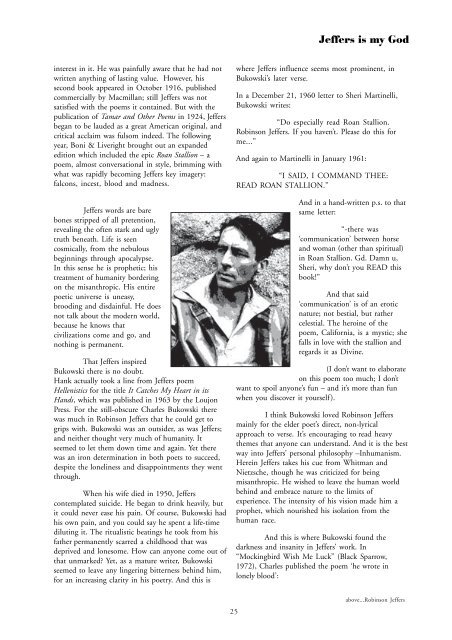You also want an ePaper? Increase the reach of your titles
YUMPU automatically turns print PDFs into web optimized ePapers that Google loves.
Jeffers is my God<br />
interest in it. He was painfully aware that he had not<br />
written anything of lasting value. However, his<br />
second book appeared in October 1916, published<br />
commercially by Macmillan; still Jeffers was not<br />
satisfied with the poems it contained. But with the<br />
publication of Tamar and Other Poems in 1924, Jeffers<br />
began to be lauded as a great American original, and<br />
critical acclaim was fulsom indeed. The following<br />
year, Boni & Liveright brought out an expanded<br />
edition which included the epic Roan Stallion – a<br />
poem, almost conversational in style, brimming with<br />
what was rapidly becoming Jeffers key imagery:<br />
falcons, incest, blood and madness.<br />
Jeffers words are bare<br />
bones stripped of all pretention,<br />
revealing the often stark and ugly<br />
truth beneath. Life is seen<br />
cosmically, from the nebulous<br />
beginnings through apocalypse.<br />
In this sense he is prophetic; his<br />
treatment of humanity bordering<br />
on the misanthropic. His entire<br />
poetic universe is uneasy,<br />
brooding and disdainful. He does<br />
not talk about the modern world,<br />
because he knows that<br />
civilizations come and go, and<br />
nothing is permanent.<br />
That Jeffers inspired<br />
Bukowski there is no doubt.<br />
Hank actually took a line from Jeffers poem<br />
Hellenistics for the title It Catches My Heart in its<br />
Hands, which was published in 1963 by the Loujon<br />
Press. For the still-obscure Charles Bukowski there<br />
was much in Robinson Jeffers that he could get to<br />
grips with. Bukowski was an outsider, as was Jeffers;<br />
and neither thought very much of humanity. It<br />
seemed to let them down time and again. Yet there<br />
was an iron determination in both poets to succeed,<br />
despite the loneliness and disappointments they went<br />
through.<br />
When his wife died in 1950, Jeffers<br />
contemplated suicide. He began to drink heavily, but<br />
it could never ease his pain. Of course, Bukowski had<br />
his own pain, and you could say he spent a life-time<br />
diluting it. The ritualistic beatings he took from his<br />
father permanently scarred a childhood that was<br />
deprived and lonesome. How can anyone come out of<br />
that unmarked? Yet, as a mature writer, Bukowski<br />
seemed to leave any lingering bitterness behind him,<br />
for an increasing clarity in his poetry. And this is<br />
where Jeffers influence seems most prominent, in<br />
Bukowski’s later verse.<br />
In a December 21, 1960 letter to Sheri Martinelli,<br />
Bukowski writes:<br />
“Do especially read Roan Stallion.<br />
Robinson Jeffers. If you haven’t. Please do this for<br />
me...”<br />
And again to Martinelli in January 1961:<br />
“I SAID, I COMMAND THEE:<br />
READ ROAN STALLION.”<br />
And in a hand-written p.s. to that<br />
same letter:<br />
“-there was<br />
‘communication’ between horse<br />
and woman (other than spiritual)<br />
in Roan Stallion. Gd. Damn u,<br />
Sheri, why don’t you READ this<br />
book!”<br />
And that said<br />
‘communication’ is of an erotic<br />
nature; not bestial, but rather<br />
celestial. The heroine of the<br />
poem, California, is a mystic; she<br />
falls in love with the stallion and<br />
regards it as Divine.<br />
(I don’t want to elaborate<br />
on this poem too much; I don’t<br />
want to spoil anyone’s fun – and it’s more than fun<br />
when you discover it yourself).<br />
I think Bukowski loved Robinson Jeffers<br />
mainly for the elder poet’s direct, non-lyrical<br />
approach to verse. It’s encouraging to read heavy<br />
themes that anyone can understand. And it is the best<br />
way into Jeffers’ personal philosophy –Inhumanism.<br />
Herein Jeffers takes his cue from Whitman and<br />
Nietzsche, though he was criticized for being<br />
misanthropic. He wished to leave the human world<br />
behind and embrace nature to the limits of<br />
experience. The intensity of his vision made him a<br />
prophet, which nourished his isolation from the<br />
human race.<br />
And this is where Bukowski found the<br />
darkness and insanity in Jeffers’ work. In<br />
“Mockingbird Wish Me Luck” (Black Sparrow,<br />
1972), Charles published the poem ‘he wrote in<br />
lonely blood’:<br />
25<br />
above...Robinson Jeffers





